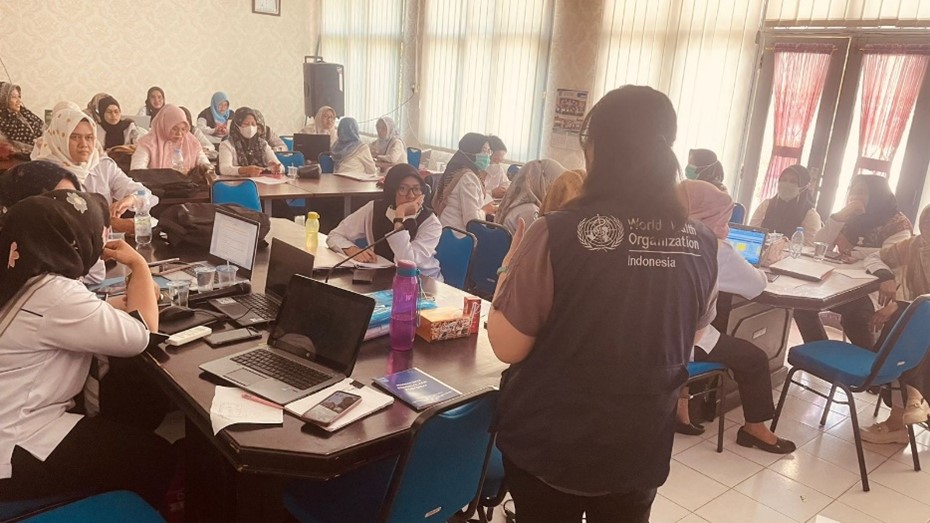The COVID-19 pandemic disrupted routine immunization and surveillance efforts in South Sumatra, resulting in a drop in annual coverage of fully immunized children from 99.4% in 2019 to 88% in 2021. High staff turnover and information gaps posed additional hurdles to immunization services.
To turn the tide, South Sumatra focused on capacity building, comprehensive training programmes, and innovative approaches for sharing information. While some primary health care centres (Puskesmas) have shown progress, it’s crucial to provide technical assistance and monitoring to facilities facing difficulties.

Enhancing the skills and knowledge of immunization staff will help reduce the number of unvaccinated children and strengthen routine immunization services to prevent further vaccine-preventable disease outbreaks. Credit: Ogan Ilir DHO/Putri
To support South Sumatra’s efforts, a WHO Vaccination Technical Officer works in the province since December 2022. This officer has been providing technical assistance, including training healthcare staff, organizing intersectoral advocacy meetings, and conducting supervisory visits to Puskesmas and integrated health posts (Posyandu). The training programmes have been tailored to address the specific needs of the immunization staff and District Health Office (DHOs) personnel. This covered various aspects, such as data recording and analysis, best practices, and strategies for overcoming field challenges.
One notable best practice highlighted during the training sessions is the innovation approach adopted by Puskesmas Indralaya in Ogan Ilir District. To encourage parents or caregivers to bring their children for immunization, Puskesmas Indralaya provides certificates to children under the age of 2 who have completed their immunization. This simple yet effective strategy has garnered attention from other Puskesmas, sparking interest in replicating this practice, albeit with necessary budget preparations.

To encourage more parents or caregivers to bring their children for immunization, Puskesmas Indralaya provides certificates to children under 2 years of age who completed their immunization. Credit: WHO/Stella Benita
The importance of intersectoral advocacy meetings in responding to vaccine-preventable disease outbreaks in the province cannot be overstated. In June 2023, when Ogan Komering Ilir District reported a diphtheria case, WHO facilitated an advocacy meeting. This meeting brought together the Head of Pematang Panggang II sub-district, heads of villages, school principals, teachers and Puskesmas staff to share information and ensure involvement of all parties to support the outbreak response and routine immunization. Through open discussions and emphasizing that diphtheria is contagious but treatable, misconceptions were dispelled, the capacity of Puskesmas and District Health Offices (DHOs) staff enhanced and villagers' fears regarding transmission alleviated. This collaborative approach fostered a sense of community and understanding as the infected child returned home to a welcoming neighbourhood.
To ensure the quality of the immunization programme, WHO also supported the PHO and DHOs in conducting supervisory visits to Puskesmas and Posyandu and providing on-the-job training for immunization staff. This addresses information gaps due to high staff turnover and inadequate handover processes. During these visits, trainers gave feedback and discussed with participants to find solutions for field challenges.
For example, during one of these visits, Puskesmas staff mentioned their difficulty in identifying children below 5 years old in need of catch-up immunization. Many of these children routinely visit the Posyandu, but due to misconceptions among both health cadres and parents, they did not reach the last service table where Puskesmas staff could screen and immunize them. Following discussions during the visit, Puskesmas staff decided to direct all children visiting the Posyandu to the last service table. Here, Puskesmas staff would review the children’s Mother and Child Health books to determine their need for catch-up immunization.
Another challenge was the significant disparity between data in manually recorded immunizations for children and the Aplikasi Sehat Indonesiaku (ASIK) digital registry. ASIK enables healthcare workers and health cadres to swiftly and systematically input the latest data, facilitating real-time monitoring of vaccination coverage rates by policymakers and identification of gaps in immunization efforts for corrective action to ensure all children receive vaccinations. Nevertheless, not all healthcare workers and cadres comprehended how to record data in ASIK. WHO officers aided in enhancing their capacity to use ASIK through training, resulting in a reduction of the reporting gap. In May 2023, there was a data gap of 23%, with 42,350 children manually recorded compared to 5,425 in ASIK, reflecting. By September 2023, this gap had narrowed to 15%.
Thanks to these interventions, South Sumatra succeeded in more than doubling complete immunization coverage from 42,350 children (27%) in January-May 2023 to 95,138 children (60%) in January-September 2023.
“High and equal immunization coverage is vital to prevent further vaccine-preventable disease outbreaks in South Sumatra. Continuous activity monitoring and capacity building are essential for all immunization staff to improve routine immunization in the province,” said Ferry Yanuar, Head of Disease Prevention and Control Division of the South Sumatra Health Office.
Collaborative efforts and support from WHO play a key role in strengthening the routine immunization programme, addressing challenges, and ensuring efficient service delivery. The assistance provided by WHO has helped to address workforce issues in the province, thus contributing to strengthen the health system. By continuing these improvements, South Sumatra can achieve high and equitable immunization coverage, ultimately enhancing public health in the region.
South Sumatra targets to have all children completely immunized by the end of 2023. To reach this goal, the PHO has asked WHO to continue the close support, and WHO is ready to provide technical assistance in future activities, such as trainings and data analysis.
This activity is supported by the Australian Government through the Vaccine Access and Regional Health Security Initiative (VAHSI).
Written by Dr Stella Benita, Vaccination Technical Officer, WHO Indonesia.
